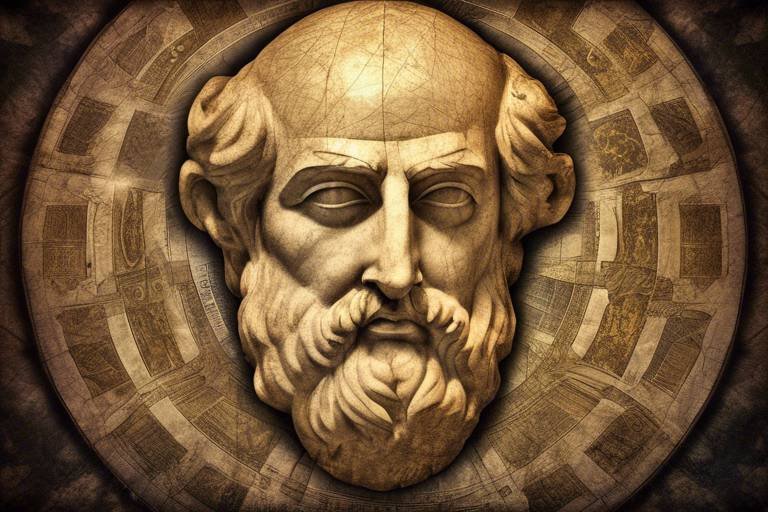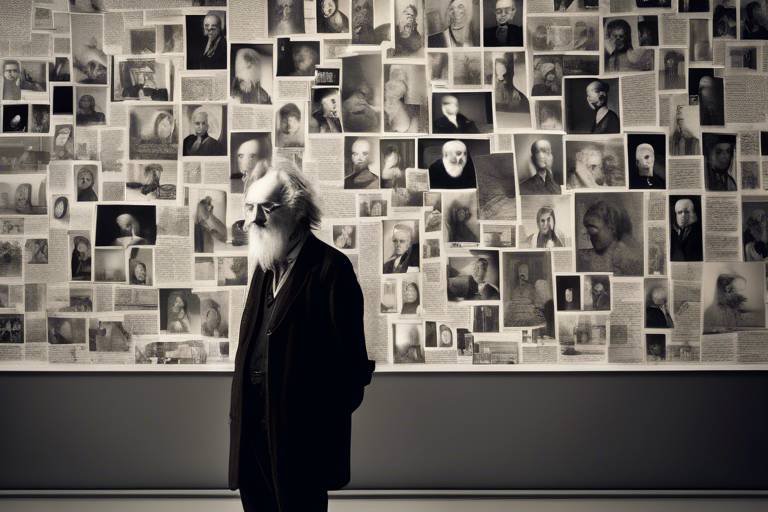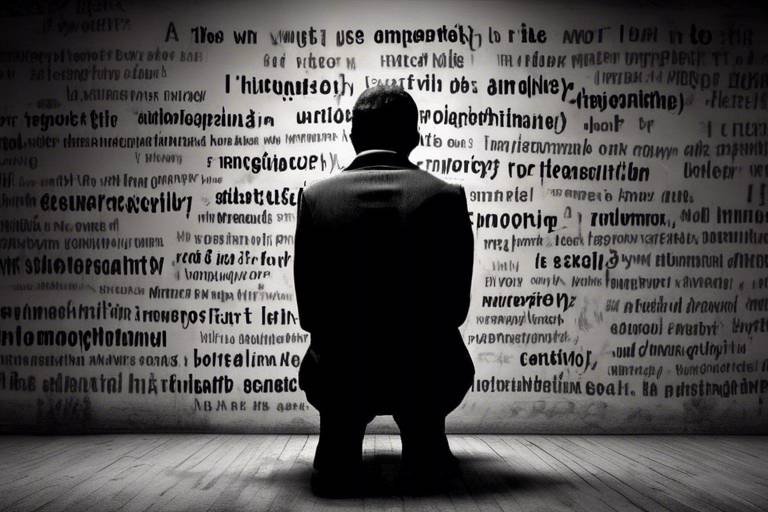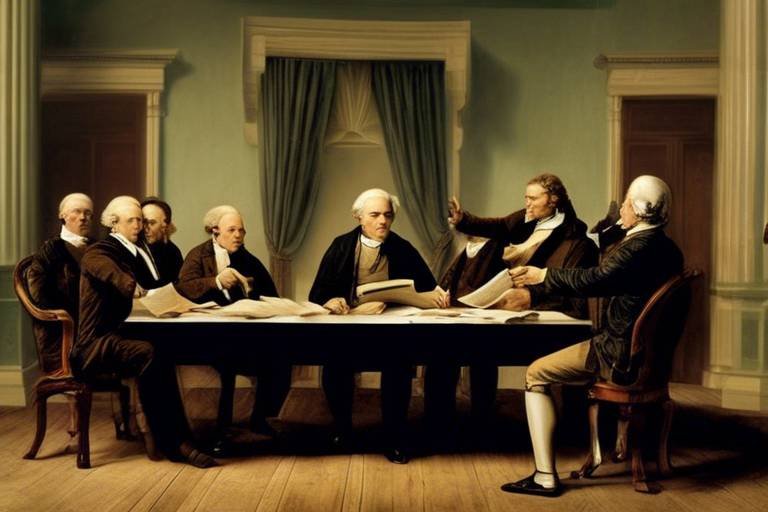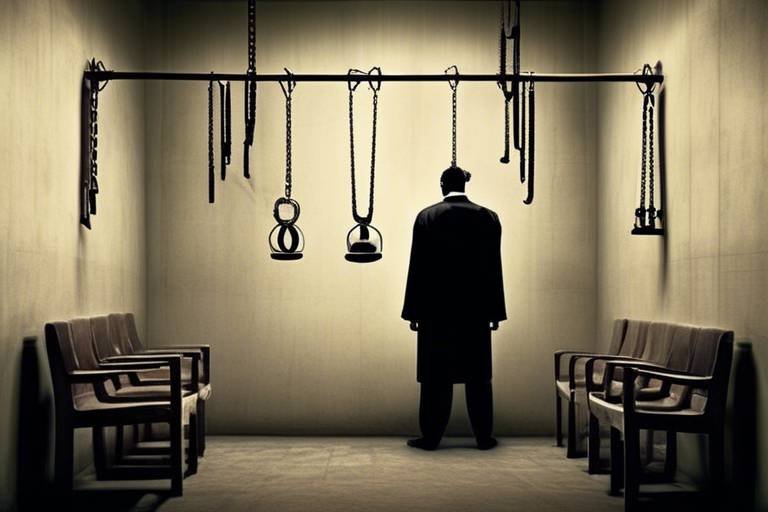Unraveling Foucault's Discourse Analysis
Welcome to the intriguing world of Michel Foucault's discourse analysis, a framework that invites us to reconsider how we understand knowledge, power, and societal norms. Foucault, a French philosopher and social theorist, challenged traditional views by proposing that discourse extends far beyond just language. It encompasses a broad range of practices, institutions, and societal norms that collectively shape our understanding of reality. So, what does this mean for us? Well, it means that to grasp the complexities of our world, we must delve deep into the discourses that govern our lives.
At its core, Foucault's analysis encourages us to question the very fabric of our social constructs. Have you ever wondered why certain ideas gain traction while others fade into obscurity? This is where discourse comes into play. It serves as a lens through which we can examine how knowledge is produced and disseminated, revealing the underlying power dynamics at work. By understanding discourse, we can better analyze the systems that dictate what is considered 'normal' or 'acceptable' in society.
Foucault's work is not just theoretical; it has profound implications for various fields, including sociology, philosophy, and cultural studies. His insights prompt us to explore how discourse shapes not only our thoughts and beliefs but also our behaviors and institutions. For instance, think about how media representations can influence public opinion or how educational systems can perpetuate certain ideologies. These are all manifestations of discourse at work, shaping our perceptions and, consequently, our realities.
Moreover, Foucault emphasizes that discourse is not static; it evolves over time, influenced by historical contexts and societal changes. This dynamic nature of discourse means that what we accept as 'truth' today may be challenged tomorrow. As we navigate through this article, we will unpack the layers of Foucault's discourse analysis, exploring its key concepts and applications across different fields. Are you ready to embark on this intellectual journey?
Discourse, according to Foucault, transcends mere language; it encompasses practices, institutions, and societal norms that shape knowledge and power relations. Understanding discourse is crucial for analyzing social constructs.
Foucault's theory posits that power and knowledge are intertwined, influencing each other in complex ways. This section delves into how knowledge production is a means of exercising power within society.
Biopower refers to the regulation of populations through various institutions. This subheading examines how governmentality shapes societal norms and individual behavior, reflecting Foucault's insights into modern power dynamics.
Foucault's analysis of surveillance highlights its role in societal control. This section discusses how surveillance practices are embedded in institutions, contributing to the normalization of behavior.
Resistance is an essential aspect of Foucault's discourse analysis. This subheading explores how individuals and groups challenge dominant discourses, leading to shifts in power relations.
Foucault emphasizes the historical dimension of discourse, arguing that knowledge is shaped by temporal contexts. This section investigates how historical events influence the emergence and transformation of discourses.
Foucault's discourse analysis has significant implications across social sciences. This section highlights its applications in fields like sociology, political science, and cultural studies, revealing its relevance in contemporary research.
This subheading presents specific case studies illustrating how Foucault's discourse analysis can be applied to sociological research, providing insights into social phenomena and structures.
Foucault's work has profoundly influenced cultural studies. This section discusses how his ideas help critique cultural representations and interrogate power dynamics within various cultural contexts.
- What is Foucault's discourse analysis? Foucault's discourse analysis is a method of examining how language and practices shape knowledge, power, and societal norms.
- How does power relate to knowledge? Foucault argues that power and knowledge are intertwined; knowledge production can be a means of exercising power.
- What is biopower? Biopower refers to the regulation of populations by institutions, influencing societal norms and individual behaviors.
- Can individuals resist dominant discourses? Yes, Foucault emphasizes that resistance is a crucial aspect of discourse analysis, allowing individuals and groups to challenge prevailing norms.

The Concept of Discourse
When diving into the world of Michel Foucault's discourse analysis, one quickly realizes that the term "discourse" is far more intricate than it may appear at first glance. For Foucault, discourse transcends the simple act of communication; it embodies a complex web of practices, institutions, and societal norms that collectively shape our understanding of knowledge and power relations. Imagine discourse as an ever-flowing river, not just a single stream of words but a vast network of currents that influence everything from our thoughts to our actions.
Understanding discourse is crucial for analyzing social constructs because it reveals how language and societal practices intertwine to create meaning. Foucault argues that discourse is not merely about what we say, but also about how we say it, who gets to say it, and the consequences of those statements in a broader societal context. This means that every utterance carries with it the weight of history, power dynamics, and cultural significance.
To break it down further, we can identify several key components of discourse:
- Language: The words we use are powerful and can shape realities.
- Practices: The actions and behaviors that are accepted or normalized within a society.
- Institutions: The structures that govern societal norms, such as schools, governments, and media.
- Knowledge: The information and beliefs that are considered valid within a particular discourse.
By examining these components, we can start to see how discourse operates as a tool for both knowledge production and the exercise of power. Foucault's analysis urges us to question not only the content of discourse but also its implications. Who benefits from the prevailing narratives? Who is marginalized or silenced? These questions are fundamental in unraveling the complexities of societal structures.
Moreover, Foucault emphasizes the historical dimension of discourse. He argues that knowledge is not static; it evolves over time, influenced by historical events and cultural shifts. For instance, consider how the discourse surrounding mental health has transformed over the last century. In the past, mental illness was often stigmatized and misunderstood, but today, there is a growing recognition of the importance of mental well-being, driven by changes in societal attitudes and scientific advancements.
In conclusion, Foucault's concept of discourse invites us to look beyond the surface of language and to consider the broader implications of our words and actions. It challenges us to recognize the power dynamics at play and to understand how our social constructs shape our realities. So, the next time you engage in a conversation, remember: you’re not just exchanging words; you’re participating in a complex dance of knowledge, power, and societal norms.
- What is the main idea behind Foucault's discourse analysis?
Foucault's discourse analysis focuses on how language, practices, and institutions shape knowledge and power relations in society. - How does discourse influence societal norms?
Discourse shapes societal norms by establishing what is considered acceptable or normal behavior through language and institutional practices. - Can you give an example of how discourse has changed over time?
Yes, the discourse surrounding mental health has evolved significantly, moving from stigma to a more nuanced understanding of mental well-being.

Power and Knowledge
When we dive into Michel Foucault's theory, we quickly realize that the relationship between power and knowledge is anything but straightforward. In fact, Foucault challenges us to rethink the very foundations of how we perceive these two concepts. Instead of viewing power as something that is merely repressive and knowledge as a tool for enlightenment, he argues that they are intricately woven together. Knowledge is not just a passive reflection of reality; it actively shapes and constructs that reality. This means that what we consider to be 'truth' is often a product of power relations. So, the next time you hear someone declare a 'fact,' ask yourself: whose power is at play here?
Foucault's assertion that knowledge is a means of exercising power opens up a fascinating dialogue about how institutions, such as schools, hospitals, and governments, wield authority. For instance, in educational settings, the curriculum is not just a collection of facts; it’s a carefully curated narrative that reflects societal values and norms. Through this lens, we can see how knowledge production is a mechanism for maintaining social order. This intertwining of power and knowledge suggests that the more we know, the more we are influenced by the structures around us. It’s a bit like being caught in a web—each thread represents a different source of knowledge that ultimately shapes our understanding and behavior.
To illustrate this complex relationship, consider the following table that highlights how power dynamics manifest through knowledge production in various institutions:
| Institution | Type of Knowledge | Power Dynamics |
|---|---|---|
| Educational Institutions | Curriculum and Pedagogy | Shapes societal norms and values |
| Healthcare Systems | Medical Knowledge | Defines health standards and practices |
| Governments | Legal Knowledge | Regulates behavior through laws |
This table demonstrates that knowledge is not just about acquiring information; it’s about understanding the implications of that information within the context of power relations. Foucault encourages us to critically examine how knowledge is produced and disseminated, prompting questions like: Who benefits from this knowledge? Who is marginalized? By dissecting these layers, we can uncover the subtle ways in which power operates in our lives.
In essence, Foucault’s exploration of power and knowledge invites us to become critical thinkers and active participants in our own understanding of the world. It challenges us to question the sources of our knowledge and recognize the underlying power structures that influence our beliefs. As we navigate through the complexities of modern society, this awareness becomes increasingly vital. It’s not just about what we know, but how that knowledge shapes our reality and, ultimately, our lives.
- What is the main idea behind Foucault's power and knowledge theory? Foucault argues that power and knowledge are interconnected, meaning that knowledge is shaped by power dynamics and, in turn, can be used to exert power.
- How does Foucault's theory apply to modern institutions? Institutions like schools, hospitals, and governments use knowledge to maintain social order and influence behavior, reflecting the power structures within society.
- Why is it important to question the sources of knowledge? Questioning knowledge sources allows us to uncover biases and power dynamics that may marginalize certain groups, leading to a more equitable understanding of social issues.

Biopower and Governmentality
When we dive into the concept of biopower, we find ourselves grappling with the intricate ways in which modern societies regulate their populations. Coined by Michel Foucault, biopower refers to the mechanisms through which power is exercised over the lives of individuals and populations. It’s not just about laws or coercion; it’s about the subtle, often invisible, ways that institutions shape behaviors, health, and even thoughts. Imagine a government not only controlling what you can do but also influencing how you think about your own body and health. That’s the essence of biopower.
At the heart of biopower is the concept of governmentality, which refers to the way governments try to produce citizens best suited to fulfill those governments' policies. This goes beyond mere governance; it encompasses a wide array of practices and strategies that aim to manage populations. Think of it as a dance between authority and freedom, where the state seeks to guide individuals towards certain behaviors while still allowing them an illusion of choice. This is where things get really interesting because it raises questions about autonomy and control.
Foucault’s analysis suggests that governmentality operates through various institutions—hospitals, schools, and prisons, to name a few. Each of these institutions plays a role in shaping societal norms and individual behavior. For instance, consider how schools not only educate but also instill discipline and conformity. They teach children not just academic skills but also social norms, effectively molding them into compliant citizens. In this way, governmentality reflects a broader strategy of social control, where the state exerts influence over the very fabric of our daily lives.
To illustrate the relationship between biopower and governmentality, let’s look at a table that summarizes some key characteristics:
| Aspect | Biopower | Governmentality |
|---|---|---|
| Definition | Regulation of populations through various means | Strategies employed by governments to manage and shape citizen behavior |
| Focus | Life, health, and bodies of individuals | Policies, governance, and institutional practices |
| Methods | Surveillance, normalization, and medicalization | Education, social services, and welfare systems |
By understanding biopower and governmentality, we can better appreciate how power operates in contemporary society. It’s not just about overt control; it’s about the subtle ways that institutions shape our identities and experiences. This perspective invites us to question our own roles within these systems and encourages a critical examination of how power dynamics affect our lives.
In conclusion, the interplay of biopower and governmentality reveals a complex web of relationships that define modern existence. Just as a spider weaves its web, so too do institutions weave the fabric of society, influencing our thoughts, behaviors, and ultimately, our very identities. As we navigate through this intricate landscape, we must remain vigilant and aware of the forces that seek to govern our lives.
- What is biopower? Biopower is a concept developed by Foucault that refers to the regulation of populations through various institutions and practices that shape behaviors and norms.
- How does governmentality differ from traditional governance? Governmentality encompasses a broader range of practices aimed at shaping citizens' behaviors and identities, rather than just enforcing laws.
- Can you provide examples of biopower in everyday life? Yes! Examples include how schools instill discipline, how healthcare systems influence our health behaviors, and how media shapes societal norms.
- What are the implications of understanding biopower and governmentality? Recognizing these concepts helps us critically analyze how power operates in society and encourages us to reflect on our own roles within these systems.

Surveillance and Control
When we think about the term surveillance, images of watchful eyes and omnipresent cameras might pop into our minds. But according to Michel Foucault, surveillance goes far beyond just keeping an eye on people; it is intricately woven into the fabric of our societal structures. Foucault's exploration of surveillance reveals how it operates as a form of control that shapes behaviors, enforces norms, and ultimately sustains power dynamics.
At the heart of Foucault's analysis is the concept of the panopticon, a theoretical prison design proposed by Jeremy Bentham. This structure allows a single guard to observe all inmates without them knowing whether they are being watched. This creates a sense of constant visibility, leading inmates to regulate their own behavior. Foucault argues that this model is emblematic of modern society, where the lines between surveillance and self-regulation blur. The essence of control lies not just in the act of watching, but in the internalization of that gaze by individuals.
In contemporary contexts, surveillance manifests in various forms, from government monitoring to corporate data collection. Consider the following examples:
- Government Surveillance: Programs like the NSA's PRISM have brought to light the extent of government oversight in our digital lives.
- Corporate Surveillance: Companies track user behavior online, tailoring advertisements and content based on individual preferences and activities.
- Social Media Monitoring: Platforms analyze user interactions to predict trends and influence public opinion.
These practices not only serve to control populations but also reinforce existing power structures. By normalizing surveillance, society accepts the notion that being watched is a part of everyday life. This acceptance breeds compliance and conformity, as individuals become aware that their actions are constantly scrutinized.
Moreover, Foucault emphasizes that surveillance is not merely a tool of oppression; it can also function as a mechanism for social order. For instance, surveillance in public spaces can deter crime and promote safety. However, this raises critical questions about the balance between security and personal freedom. Are we sacrificing our privacy for the sake of safety? Foucault encourages us to interrogate these power dynamics and understand how they shape our daily lives.
In essence, surveillance operates as a form of disciplinary power that extends beyond physical observation. It influences how we perceive ourselves and our roles within society. The normalization of surveillance leads to a culture of self-policing, where individuals internalize societal expectations and regulate their own behavior. This phenomenon is evident in various aspects of life, from social media interactions to workplace dynamics, where the fear of being watched can alter our actions and choices.
Foucault's insights compel us to reflect on the implications of surveillance in our lives. As we navigate a world increasingly defined by technological advancements and data collection, understanding the dynamics of surveillance and control becomes crucial. Are we merely subjects of observation, or do we have the agency to resist and redefine the narratives imposed upon us? The answers lie in our ability to critically engage with the systems that seek to govern our behaviors.
- What is Foucault's concept of surveillance?
Foucault's concept of surveillance refers to the ways in which power is exercised through observation and monitoring, shaping individuals' behavior and societal norms. - How does surveillance impact personal freedom?
Surveillance can limit personal freedom by creating a culture of self-regulation, where individuals conform to societal expectations out of fear of being watched. - Can surveillance have positive effects?
While often seen as oppressive, surveillance can also promote safety and social order, though it raises concerns about privacy and individual rights.

Resistance and Counter-Conduct
In the realm of Foucault's discourse analysis, resistance is not merely a reaction against power; it is an integral part of the power dynamic itself. Foucault believed that wherever there is power, there is also the potential for resistance. This relationship is akin to a dance: as power moves in one direction, resistance flows in the opposite, creating a complex interplay that shapes societal norms and individual behaviors. The concept of counter-conduct emerges from this dance, highlighting the ways individuals and groups can challenge and subvert dominant discourses.
Resistance can take many forms, from overt protests and activism to subtle acts of defiance in everyday life. For instance, consider how marginalized communities often create their own narratives to counter mainstream representations. This act of storytelling is not just a way to reclaim their identity but also a powerful form of resistance against the dominant discourses that seek to define them. Foucault's insights remind us that resistance is not always loud and disruptive; it can be quiet, persistent, and deeply rooted in the fabric of society.
Moreover, the concept of counter-conduct emphasizes that resistance is not merely about opposing power but also about redefining what it means to be governed. Foucault argued that individuals can engage in practices that challenge the norms imposed upon them, effectively reshaping their own conduct in the process. This can manifest in various ways, such as:
- Subverting Norms: Individuals may choose to reject societal expectations, creating alternative ways of living that challenge the status quo.
- Creating New Discourses: By articulating their experiences and perspectives, marginalized voices contribute to the emergence of new discourses that contest dominant narratives.
- Collective Action: Groups may organize to resist oppressive structures, showcasing the power of solidarity in effecting change.
Foucault’s analysis also encourages us to consider the implications of resistance in our everyday lives. It prompts us to ask questions like: How do we navigate the power structures around us? In what ways can we assert our agency in a world that often seeks to constrain it? These reflections are crucial because they remind us that resistance is not just a theoretical concept; it is a lived experience that can inspire change.
In essence, resistance and counter-conduct serve as vital mechanisms for individuals and groups to challenge the power dynamics that shape their lives. They highlight the ongoing struggle for autonomy and the quest for a more equitable society. By understanding and engaging with these concepts, we can better appreciate the complexities of social interactions and the potential for transformative change.
- What is Foucault's concept of resistance?
Foucault's concept of resistance refers to the idea that wherever there is power, there is the potential for resistance. It highlights the dynamic interplay between power and opposition. - How does counter-conduct relate to resistance?
Counter-conduct refers to practices that individuals engage in to challenge and redefine the norms imposed by power structures, effectively reshaping their own conduct. - Can resistance be subtle?
Yes, resistance can take many forms, including subtle acts of defiance in everyday life, as well as overt protests and activism. - Why is understanding resistance important?
Understanding resistance is crucial for recognizing the complexities of social interactions and the potential for transformative change in society.

Historical Context of Discourse
When we dive into Foucault's discourse analysis, we quickly realize that it is not just about the words we use or the language we speak. Instead, it’s a rich tapestry woven from the threads of history, culture, and social practices. Foucault posits that every discourse is a product of its time, shaped by the historical contexts in which it emerges. This means that to fully grasp the implications of any discourse, we must consider the historical events and cultural shifts that influence its formation.
Take, for example, the discourse surrounding mental health. In the past, individuals with mental health issues were often labeled as "mad" and subjected to harsh treatments. However, as society evolved, so did the language and understanding of mental health. This transformation reflects a shift in societal norms and values, highlighting how historical contexts can redefine our perceptions and the language we use to discuss them. Foucault’s work encourages us to ask: How have historical events shaped our current understanding of various discourses?
Furthermore, Foucault emphasizes the importance of power dynamics in understanding discourse. The way knowledge is produced and disseminated is deeply influenced by the political and social structures of the time. For instance, during the Enlightenment, the rise of reason and scientific thought led to the emergence of new discourses around governance, morality, and individual rights. This period marked a significant shift where knowledge was no longer solely in the hands of the elite but became a tool for the masses, albeit still influenced by those in power.
To illustrate this point, let’s consider a brief timeline of significant historical events that have shaped discourse:
| Year | Event | Impact on Discourse |
|---|---|---|
| 1789 | French Revolution | Shift in power dynamics; emergence of new political discourses. |
| 1861-1865 | American Civil War | Debates around freedom and equality; reshaping of social discourse. |
| 1960s | Civil Rights Movement | Challenging dominant narratives; emergence of new voices in discourse. |
| 1990s | Internet Revolution | Globalization of discourse; democratization of knowledge. |
Each of these events not only influenced the sociopolitical landscape but also transformed the language and discourse surrounding them. Foucault's analysis helps us understand that knowledge is not static; it evolves with the times, reflecting the changing values and power structures within society.
In conclusion, the historical context of discourse is pivotal in understanding how and why certain narratives emerge, dominate, or fade away. By recognizing the interplay between history and discourse, we can better analyze contemporary issues and the power relations that underpin them. This historical lens is crucial for anyone looking to engage deeply with Foucault's theories and apply them to modern-day contexts.
- What is discourse according to Foucault? Discourse encompasses not just language but also the practices, institutions, and societal norms that shape knowledge and power relations.
- How does historical context influence discourse? Historical events and cultural shifts can redefine perceptions and the language used to discuss various topics, as seen in the evolution of mental health discourse.
- What is the relationship between power and knowledge? Foucault argues that power and knowledge are intertwined, influencing each other in complex ways, particularly in how knowledge is produced and disseminated.

Applications in Social Sciences
Michel Foucault's discourse analysis is not just an abstract theory; it's a powerful tool that has found its way into various fields within the social sciences. By examining the intricate relationships between knowledge, power, and social practices, Foucault's ideas have reshaped how researchers approach the study of society. From sociology to political science and cultural studies, his work provides a framework for understanding the underlying mechanisms that govern human behavior and social structures.
In sociology, for instance, Foucault's discourse analysis offers a lens through which to explore how social norms and values are constructed and maintained. By analyzing the language and practices within specific contexts, sociologists can uncover the hidden power dynamics at play. For example, consider the discourse surrounding mental health. Historically, the way society has talked about mental illness reflects broader societal attitudes and influences the treatment of individuals within that framework. This analysis can reveal how certain narratives become dominant, shaping public perception and policy.
Moreover, Foucault’s concepts of biopower and governmentality provide critical insights into how institutions regulate populations. By understanding these dynamics, political scientists can analyze how governmental policies are influenced by discourses that prioritize certain populations over others. This has significant implications for contemporary issues such as immigration, healthcare, and social justice, where the language used by policymakers can either empower or marginalize communities.
To illustrate the impact of Foucault's theories, let's consider a few key applications in the social sciences:
| Field | Application |
|---|---|
| Sociology | Analyzing social norms and their evolution through discourse. |
| Political Science | Understanding the influence of language on policy-making and governance. |
| Cultural Studies | Critiquing cultural representations and power dynamics in media. |
Foucault’s influence extends to cultural studies as well, where his ideas challenge traditional narratives and encourage critical analysis of cultural texts. By interrogating the power relations embedded in cultural representations, researchers can uncover how these narratives shape societal perceptions and identity. For instance, examining media portrayals of race, gender, and sexuality through a Foucauldian lens allows scholars to reveal the subtle ways in which power operates within cultural contexts.
Furthermore, Foucault's discourse analysis encourages a reflexive approach among researchers. It prompts them to consider their own positionality and the power dynamics inherent in their research practices. This self-awareness is crucial in social sciences, where the researcher’s influence can shape the very discourse they seek to analyze. By acknowledging their role, researchers can strive for a more ethical and responsible engagement with the subjects of their study.
In conclusion, Foucault's discourse analysis serves as a vital framework for exploring the complexities of social phenomena. Its applications across various fields highlight the interconnectedness of knowledge, power, and social practices, empowering researchers to challenge dominant narratives and contribute to a more nuanced understanding of society.
- What is Foucault's discourse analysis? It is a method of examining how language and practices shape knowledge and power relations in society.
- How can Foucault's theories be applied in sociology? They can be used to analyze social norms, values, and the power dynamics that influence them.
- What is biopower? Biopower refers to the regulation of populations by institutions and how this regulation shapes individual behavior.
- Why is understanding discourse important in social sciences? It helps uncover the hidden power structures that influence societal norms and individual experiences.

Case Studies in Sociology
When we think about Foucault's discourse analysis, it’s like opening a Pandora's box of sociological insights that can radically change our understanding of social structures. One fascinating aspect is how his theories can be applied in real-world scenarios to uncover the underlying power dynamics that shape our society. Let’s dive into a couple of compelling case studies that illustrate the practical application of Foucault's ideas in sociology.
First, consider the case of the mental health system in the late 20th century. Foucault’s work, particularly in "Madness and Civilization," sheds light on how societal attitudes towards mental illness have evolved. Initially, individuals labeled as "mad" were often ostracized and confined to asylums. However, as discourse around mental health shifted, so did the treatment and understanding of these individuals. This transformation wasn’t just about changing language; it was about the power structures that governed how society perceived and treated mental illness. By analyzing the discourse surrounding mental health, sociologists can reveal how institutions like hospitals and legal systems perpetuate certain narratives that either empower or marginalize individuals.
Another intriguing case study can be found in the realm of education. Foucault’s concept of governmentality plays a crucial role in understanding how educational institutions function as sites of power and knowledge production. For instance, consider the way standardized testing has become a dominant discourse in education. This practice not only assesses student performance but also shapes educational policies and funding. By examining the discourse surrounding standardized testing, sociologists can unpack how it influences student behavior, teacher practices, and even parental expectations. This analysis reveals that knowledge production in education is not neutral; it is deeply intertwined with societal norms and power relations.
Moreover, Foucault’s notion of surveillance can be observed in various social contexts, such as the criminal justice system. The way society monitors and controls behavior through laws and regulations reflects Foucault’s idea of the "panopticon." In a case study focusing on policing practices, researchers can explore how surveillance technologies, like CCTV cameras, are employed in urban areas. This leads to a discourse that normalizes constant observation, impacting how individuals behave in public spaces. By analyzing these practices, sociologists can highlight the implications of surveillance on personal freedom and privacy, emphasizing the relationship between power and control.
These case studies illustrate that Foucault’s discourse analysis is not just theoretical; it has profound implications in understanding real social phenomena. By applying his concepts, sociologists can uncover the intricate web of power relations that shape our lives. It’s like peeling back the layers of an onion, revealing the complex structures that influence our thoughts, behaviors, and societal norms.
- What is Foucault's discourse analysis?
Foucault's discourse analysis examines how language, practices, and institutions shape knowledge and power relations in society. - How can Foucault's theories be applied in sociology?
His theories can be applied to various social phenomena, such as mental health, education, and surveillance, to uncover underlying power dynamics. - Why is understanding discourse important?
Understanding discourse helps analyze social constructs and reveals how knowledge production influences societal norms and behaviors.

Impact on Cultural Studies
Michel Foucault's contributions to cultural studies are nothing short of revolutionary. His ideas challenge traditional perspectives and invite scholars to interrogate the very foundations of cultural representation. By emphasizing the relationship between power and knowledge, Foucault encourages a critical examination of how cultural narratives are constructed and disseminated. This perspective is crucial for understanding the dynamics of culture in a society that is constantly evolving.
Foucault's concept of discourse extends beyond language to include the practices and institutions that shape our understanding of culture. For instance, when analyzing media representations, one must consider how these portrayals are influenced by societal norms and power structures. This lens allows researchers to uncover the often hidden mechanisms that dictate what is considered normal or acceptable in various cultural contexts.
Moreover, Foucault's work on biopower and governmentality has profound implications for cultural studies. These concepts illuminate how cultural practices are regulated and controlled by institutions, from educational systems to media outlets. By understanding these dynamics, cultural studies scholars can better analyze how individuals and groups navigate, resist, or conform to these power structures.
In practical terms, Foucault's framework has led to a variety of applications within cultural studies, including:
- Critique of Cultural Representations: Scholars use Foucault’s ideas to deconstruct how marginalized groups are portrayed in media and literature, revealing underlying biases and power imbalances.
- Interrogation of Normativity: Foucault’s emphasis on the historical context of knowledge allows researchers to challenge the status quo and question what is deemed normal within a culture.
- Exploration of Identity: His theories help analyze how identities are formed and regulated through cultural practices, leading to a deeper understanding of intersectionality.
Furthermore, Foucault’s notion of resistance is vital in cultural studies. It highlights that where there is power, there is also the potential for challenge and change. This aspect of his work encourages cultural scholars to explore how various movements—be it feminist, LGBTQ+, or anti-racist—emerge as responses to dominant cultural narratives. These movements not only resist existing power structures but also create new discourses that redefine cultural norms.
In summary, Foucault's impact on cultural studies is profound and multifaceted. His theories provide essential tools for critiquing cultural practices and understanding the intricate relationships between power, knowledge, and representation. By applying his insights, scholars can continue to unravel the complexities of culture, making sense of the world around us in a more nuanced and informed manner.
- What is Foucault's main contribution to cultural studies?
Foucault's main contribution lies in his analysis of the relationship between power and knowledge, which encourages critical examination of cultural narratives and representations. - How does Foucault's concept of biopower relate to culture?
Biopower refers to the regulation of populations, which influences cultural practices and norms through institutions, shaping what is considered acceptable behavior. - Can Foucault's theories be applied to contemporary issues?
Yes, Foucault's theories remain relevant today, providing frameworks for analyzing modern cultural phenomena, including media representation and identity politics.
Frequently Asked Questions
- What is Foucault's concept of discourse?
Foucault's concept of discourse goes beyond just language; it includes the practices, institutions, and societal norms that shape our understanding of knowledge and power. Essentially, discourse is how we communicate and construct meaning in society, influencing everything from politics to culture.
- How do power and knowledge interact in Foucault's theory?
Foucault argues that power and knowledge are deeply intertwined. Knowledge isn't just a tool for understanding the world; it's also a means of exerting power. For example, the way information is produced and disseminated can reinforce or challenge existing power structures.
- What does biopower mean in Foucault's analysis?
Biopower refers to the regulation of populations through various institutions and practices. It's about how governments and organizations manage people’s lives, health, and behaviors, reflecting Foucault's insights into modern governance and societal norms.
- How does surveillance relate to societal control according to Foucault?
Foucault highlights that surveillance is a key mechanism of societal control. By monitoring behavior, institutions can enforce norms and expectations, often leading to self-regulation among individuals. This creates a culture where conformity is normalized.
- What role does resistance play in Foucault's discourse analysis?
Resistance is a vital part of Foucault's framework. It’s not just about submission to power; individuals and groups can challenge dominant discourses. This resistance can lead to shifts in power relations and create new social dynamics.
- Why is the historical context important in Foucault's analysis of discourse?
Foucault emphasizes that knowledge is shaped by its historical context. This means that the way we understand and produce knowledge is influenced by the events and cultural conditions of a specific time, which can lead to the emergence or transformation of discourses.
- How is Foucault's discourse analysis applied in social sciences?
Foucault's theories have significant implications across various fields in social sciences. Scholars use his ideas to analyze power dynamics, social structures, and cultural practices, providing deeper insights into contemporary societal issues.
- Can you give examples of case studies in sociology using Foucault's discourse analysis?
Yes! Many case studies apply Foucault's discourse analysis to examine social phenomena, such as the role of institutions in shaping identities or how societal norms influence behavior. These studies reveal the intricate relationships between power, knowledge, and social structures.
- What impact has Foucault had on cultural studies?
Foucault's work has profoundly influenced cultural studies by providing tools to critique cultural representations and interrogate power dynamics. His ideas encourage scholars to explore how culture shapes and is shaped by societal power relations, making his theories essential for understanding contemporary cultural contexts.


